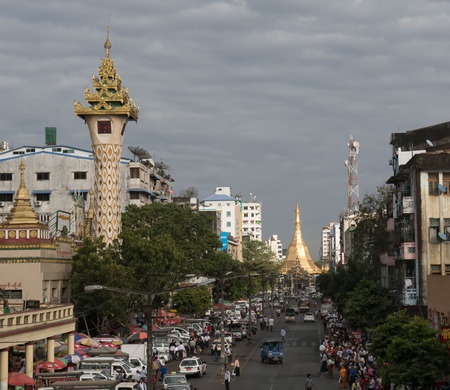24 July, 2017
Myanmar has stepped into the international stage following 49 years (from 1962 to 2011) of political and economic isolation under the now dissolved military junta. The country has successfully transitioned to a civilian government following the November 2015 elections.
Here is a chronology of key events in Myanmar:
-
1057: King Anawrahta founded the first unified Myanmar state at Pagan and adopts Theravada Buddhism
-
1287: Mongolian forces, under Kublai Khan conquered Pagan
-
1531: Toungoo Dynasty, with assistance from the Portuguese reunites the country as Burma
-
1886: Burma becomes a province of British India
-
1937: Britain separates Burma from India and makes it a crown colony 1942: Japan occupied Burma in World War II
-
1945: Britain liberates Burma with help from Anti-Fascist People’s Freedom League, led by Aung San
-
1948: Burma transitioned into an independent country
-
1962: Military coup in Burma as single-party state, Socialist Programme Party was formed
-
1988: The State Law and Order Restoration Council is formed as thousands of people were killed in anti-government riot
-
1989: National League of Democracy leader, Aung San Suu Kyi, daughter of Aung San was put under house arrest. Ruling military junta changed its name from Burma to Myanmar
-
1990: National League of Democracy wins landslide victory in general election, but the results were ignored by the military
-
1991: Aung San Suu Kyi awarded Nobel Peace Price for her commitment to peaceful change
-
1997: Myanmar admitted to the Association of South East Asian Nations (ASEAN)
-
2000: Aung San Suu Kyi begins secret talks with the military junta’s ruling council
-
2005: The Myanmar government moved its capital city from Yangon to Naypyidaw
-
2010: Military-backed party, the Union Solidarity and Development Party claims resounding victory in first election in 20 years.
-
2011: The military junta retires and President U Thein Sein is sworn in as new, nominally civilian government
-
2012: President U Thein Sein passes the Foreign Investment Law leading to unprecedented economic growth in Myanmar
-
2015: Aung San Suu Kyi’s National League for Democracy wins enough seats in parliamentary elections to form a government
-
2016: National League for Democracy President U Htin Kyaw passes the Myanmar Investment Law.
Myanmar Investment Law
On November 2 2012, the Pyidaungsu Hluttaw (Myanmar’s Parliament) passed the Foreign Investment Law 2012 (“FIL”). The FIL was designed to entice a new wave of foreign investors into Myanmar by providing them with tax and other incentives to create a more investor friendly regulatory regime. After the implementation of the FIL Myanmar experienced a period of unprecedented economic growth. In December 2013, Myanmar’s Directorate of Investment and Company Administration (“DICA”) started to draft a new Myanmar Foreign Investment Law (“MIL”) with support from both the International Finance Corporation and legal experts. The MIL is aimed at the next wave of FDI and encouraging continued economic growth. The MIL was passed on 18 October 2016 and the implementing rules (regulations) (“MIL Rules”) were passed in April 2017.
The MIL and MIL Rules create:
• An improved legal and regulatory framework
• Simplification of the administrative procedures for foreign investors
• Establishment of support mechanisms
• Rationalisation of investment incentives to focus FDI to areas with greatest growth potential in the private sector
• An alternative and quicker pathway (“Endorsement”) to obtain the right to enter into a long term lease.
Myanmar Companies Law
In 2013, Myanmar’s DICA started to draft the new Myanmar Companies Law (“MCL”) with assistance of the Asian Development Bank and international legal experts. The MCL is expected to pass on 1 June 2017. The MCL will replace the severely outdated Myanmar Companies Act 1914 (“MCA”).
The MCA is contained in Volume IX of the Myanmar Code. The MCA is based on its British colonial heritage, the company law provisions contained in Volume IX of the Myanmar Code generally reflect the common law principles of company law which were in existence when the provisions contained in the Myanmar Code were drafted. After Myanmar’s independence in 1948, due to the controlled nature of Myanmar’s economy, the MCA lay virtually moribund.
The new draft MCL will take into account recent developments in company law from the UK, Australia and New Zealand.
The legislation is aimed at :
-
Simplifying requirements for small and family-owned businesses
-
Improving corporate governance standards and introducing new directors duties
-
Removing outdated regulations
-
Allowing foreign investors to hold a 33% shareholding in Myanmar companies and buy shares in local companies listed on the Yangon Stock Exchange
-
Assisting local firms to attract international funding and expertise.
Conventus Law and Duane Morris & Selvam recently conducted an report on the current business, legal, political and economic climate of doing business in Myanmar. The report is designed to deliver key legal insights and business data to investors doing in Myanmar.
We wanted this report to be different from others. To do this, we have designed the report so that is constantly updated and our readers will have opportunities to contribute and to interact with the contibutors.
The report focuses on 3 key areas, Myanmar's business climate, Myanmar's updated laws and legislation and Myanmar as a foreign direct investment destination. As well as the findings, there are interviews with subject matter experts who have had experience in doing business in Myanmar.

.jpg)





